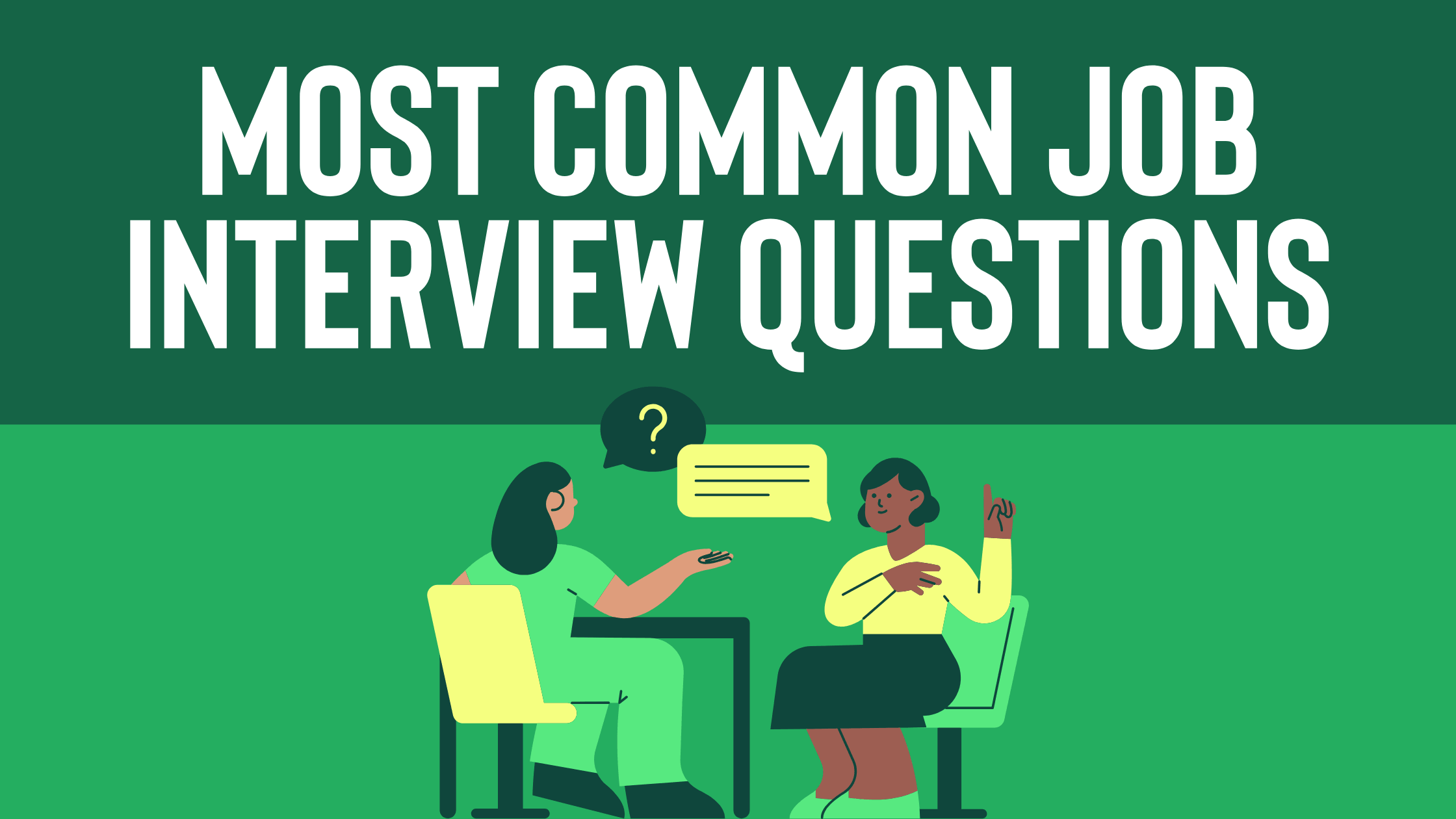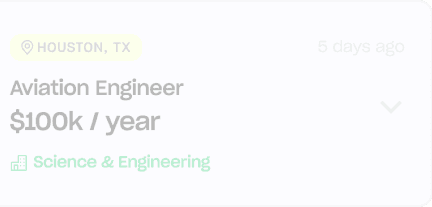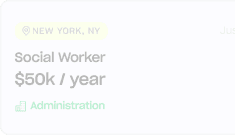

The growing competition in the job market is pushing applicants to find any way they can to stand out. There may be hundreds of applicants for a single job, especially for higher-paying jobs.
Jobvite, a talent acquisition technology company, found from their customer data that only 8.4% of applicants are called for a job interview. Don’t let that number scare you though! They also found that of those who get called for an interview, 36.2% of them are selected to receive offers.
How you prepare for that interview could make or break your chances of getting a job offer. This is why it’s important to research and practice some of the most common job interview questions and answers out there.
?
Key Points:
- We’ve gathered these top questions from interviewing those in our community (like the video above), and job sites like Glassdoor and Indeed.
- Not all job interview questions will be the same for everyone. What you’re asked in an interview depends on the role and interviewer.
- These common job interview questions are a mix of what you might get asked from both HR and your hiring manager.
- Most job interviews include general, behavioral, and situational questions.
- The example answers provided are for guidance and should be modified to fit your situation.
- No job interview answer is the absolute right answer. There are several different ways to answer any of these questions. What’s most important is how you convey your experience, expertise, and why you’re the best fit for the job.
- You don’t need to memorize your answers word-for-word but instead practice them with someone to get used to how the conversation may flow.
- It’s recommended to find your market salary range for the position before your interview, so you’re prepared for any salary-related questions.
- Use our Salary Database to get access to thousands of reported salaries and job data from our community.
Top 10 Most Common Job Interview Questions, Answers, & Examples
What’s the perfect way to land a job? A killer resume, a unignorable cover letter, and finally, a smooth job interview where the hiring manager falls in love with you (in a professional way).
?
If only you could read the mind of the interviewer, you would never have to fret over another job interview again. You can dream, can’t you? Well, while you’re dreaming, let’s kick your job interview preparation into high gear.
The most common types of job interview questions are standard/traditional questions and behavioral questions. Other popular types are situational questions, competency-based questions, technical questions, and cultural-fit questions.
Use this list of the most popular job interview questions and examples of possible answers to help prepare for your next interview.
Pro tip: Use this article alongside a free job interview course. We recommend this one from Coursera!
1. Can you tell me a bit about yourself?
This is the #1 most common job interview question out there and many job interviews will start with this question. Think of your answer as “the hook” of a good story. 30% of interviewers will make up their minds about a candidate in the first 5 minutes of an interview, according to HireVue. When an interviewer asks you to tell them a little bit about yourself and your background, they don’t mean your entire life story. They want to hear your career story – with a good hook.
?
Start your story with the early days of your career and education, and add some personal notes from your background so you don’t sound like a job-wanting AI. Include how and why you wanted to pursue the specific career you have. From there, briefly talk about your work experience in ways that mirror what you would do in this job position, making you appear naturally as the best fit for the job.
Don’t leave out any of the good details either. Mention your accomplishments and anything else that makes you the obvious choice for the job.
Answer example: “Before I had 11 years of IT experience under my belt, I started playing with website development in high school. From there, I knew I wanted to do something in the technology field. After graduating with a bachelor’s degree in computer science, I started my career with an internship as a web engineer working for a small web development startup company. The expertise learned in these early years set me up for my next positions as a programmer and systems analyst working in both retail and government sectors, learning how to develop for and support custom enterprise systems. That early startup experience mixed with my corporate experience led me to working for a well-known financial technology company as a software engineer, and later was promoted to a lead reliability engineer. I love learning about new technologies and ways to challenge myself as I grow in my career, and make it a priority to invest time into continually building my skills to stay ahead of the curve.”
2. Why are you looking for a new position?
?
Be careful with this question! Avoid responding with any sarcasm, such as, “because I need money,” or, “because I need a job”. Sure, the answer to this question is obvious. We all work jobs because we need money, but the interviewer is looking for a specific answer.
They may be looking for red flags like if you were recently fired and why. Another possibility is they want to see how committed you are to your career growth. They want to see what motivates you and the respect you have for your current or past roles.
Either way, keep it light. You don’t want to end up talking bad about your current or previous employer, nor bring negativity to the overall mood of the interview.
Answer example: “I don’t believe I’m being challenged enough in my current role. Although I enjoy working for that company and with my fellow coworkers, I feel like I am getting stagnant in my career. I am looking for other opportunities to grow my expertise and start the next chapter in my career path.”
If you’re looking for a new position because you were let go and don’t currently have a job, describe that in a brief way like the following examples show. You may have to tweak these to match your own situation.
Answer example: “I was let go from my most recent role due to budget constraints and left on good terms.”
Answer example: “I was recently laid off from my most recent position due to the company outsourcing my department. I stayed on to help with that transition and left on good terms.”
3. What are your salary expectations?
When asked what your salary expectations are for a job, there is more than one way to answer. It’s also your first step to negotiating your salary by setting those initial expectations. But you can’t set those expectations without knowing your own market salary range.
It’s best if you can get the interviewer to provide their budget first but either way, you should have your market rate in your back pocket in case they push for it. This is where our free Market Research Guide and Salary Database come in handy. Use this guide and salary data to help you in your research and see what matches up with your own experience and skill set.
Answer example: “I have an expected range in mind based on my market rate, but it's too early in the interview process for me to gauge the full scope of this position. Would you mind sharing the budget for this role?” – The founder of Salary Transparent Street, Hannah Williams, got a $25,000 raise from using a salary negotiation script like this!
If an interviewer asks for your current or last salary, there are pay transparency laws in 36 states that may get them in trouble.
?
You can deflect the answer respectfully. Or you can reframe your answer to express your market salary and expectations.
Answer example: “Before we discuss salary, can you please tell me more about the role and what it fully entails?”
?
4. What professional achievement are you most proud of?
When an interviewer asks this, they don’t only want to know what the achievement was. They also want to know what you did, what the result was for the company, and why it’s the one you’re most proud of. If you don’t cover this in your initial answer, they will most likely follow up with those points.
The STAR Interview method is perfect for answering behavioral questions like this. STAR stands for Situation, Task, Action, and Result and it’s a specific format to help fully convey your contributions.
Answer example:
Situation: "In my previous role as a marketing manager at ABC Company, we saw declining engagement with our email marketing campaigns, which was impacting our overall sales."
Task: "I was tasked with updating our email marketing strategy to increase engagement and drive more sales. The goal was to achieve a 15% increase in open rates and a 10% increase in click-through rates within six months."
Action: "I started by analyzing our current email campaigns to identify gaps and areas for improvement. I then segmented our email list based on customer behavior and preferences to ensure more personalized content and redesigned the email templates to be more visually appealing and mobile-friendly. I also implemented A/B testing for subject lines and call-to-action buttons to determine what resonated best with our audience. This was all while working closely with the content team to create relevant content that addressed the needs and interests of our subscribers."
Result: "As a result, we saw a significant improvement in our email marketing performance. Our open rates increased by 20%, our click-through rates by 15%, and 20% increase in sales. This also strengthened our relationship with our customers by providing them with more relevant and engaging content."
Use this course to help: Accomplishment STAR Techniques for Job Interviews
5. What are your strengths and weaknesses?
?
For this question, identify one or more of your strengths and weaknesses, and provide clear examples of each. Bonus points if you can provide examples that align with the required skills of the position.
The weaknesses you want to mention should be realistic but don’t make you look bad. Don’t mention that you have trouble waking up on time, but do mention a subtle weakness like communication with an example of what you’ve done to improve that skill.
Answer example:
Strengths: "One of my key strengths is my strong troubleshooting skills and the ability to communicate effectively how to implement solutions based on that troubleshooting data. Communication is one of the most important skills in any role, for a lack of communication can be what deadlocks a project. For example, when I was faced with an enterprise-wide system outage, I had to troubleshoot the issue and find a solution quickly. I also had to communicate my progress in parallel to working on the problem itself, keeping all stakeholders in the loop so they can make sure there is a constant stream of communication also going out to clients. Because of this, the team was able to implement a solution that same day and there was no financial impact.
Weaknesses: "An area of weakness I have is my tendency to be overly detail-oriented in my communication to higher-level stakeholders. Adding too much low-level information about an issue can cause misunderstandings and overly complicate things, which has happened to me many times during system outages. To address this, my communication includes simplified high-level detail that goes out to a high-level audience, while still keeping those detailed notes for the technical team and for record. This approach has helped to maintain a better understanding between cross-functional teams.”
6. Can you describe a challenge you've faced at work and how you handled it?
This is another behavioral question perfect for using the STAR method to answer. Describe what the situation was that posed a challenge, what your task and goal was, actions you took, and the end-result from those actions.
Answer example:
Situation: "In my previous role as a project manager at EFG Company, we were tasked with launching a new product line within a tight deadline of three months."
Task: "My responsibility was to coordinate the efforts of the marketing, design, and production teams to ensure we met the launch date without compromising quality."
Action: "I started by setting clear milestones and deadlines for each team and implemented weekly progress meetings to track our status. I also introduced a shared project management tool that improved asynchronous communication and collaboration among the team. When we faced delays from the design team, I set up brainstorming sessions to identify solutions and reallocated resources to maintain our timeline."
Result: "As a result, we successfully launched the product line on time. The launch led to a 15% increase in quarterly sales and positive feedback from both customers and stakeholders."
?
7. Why do you want to work here?
With this question the interviewer wants to see what you know about the company and how much research you did about the role. They also want to know your intentions for working there and if you’re someone that they can rely on to fulfill the requirements of the role.
Answer example: “I’ve done a lot of research on the company and have used their software in many of my past jobs. Their values also align well with my own. I think that when you work for a company that you believe in and want to grow with, that adds to your job satisfaction and overall quality of life. When you’re in that type of alignment, your career path can evolve in some amazing ways. I also think this specific role perfectly matches up with my experience, expertise, and my future career goals.”
8. Are there any other companies you’re interviewing with or considering?
Companies want to gauge their applicants job search progress to help with their own hiring process. This is one of those questions that helps them see if there will be any competition for them when hiring you. If you have multiple companies you’re interviewing for or have offers from, feel free to say that you’re keeping your options open. And if you don’t, that’s okay to share too.
?
Answer example: "Yes, I’m currently exploring a few opportunities with other companies in the industry that align with my career goals and professional interests. However, I am particularly excited about this position with your company because of [specific reasons related to the company, such as its projects, culture, values, etc.].”
If you don’t have any others you’re interviewing for, the following example will do.
Answer example: “Not yet since I only recently started applying to a few roles. However, I am particularly excited about this position with your company because of [specific reasons related to the company, such as its projects, culture, values, etc.].”
9. Why should we hire you?
This question is similar to #7, “Why do you want to work here," but focuses more on you rather than what's appealing about the company or role. The interviewer wants to know what you can bring to the company if you were to be hired.
Briefly explain how your contributions will add business value to the company. What results do you expect to yield and how will those help advance the company? Your answer will also come in handy when negotiating salary.
Answer example: “My specific skill set and experience perfectly aligns with the requirements for this role. I’ve worked as an associate for 3 years, a manager for 4 years, and over the past 2 years I have served as a regional director. I’ve also worked in several different sectors, creating the perfect combination to be able to adapt to different situations and see solutions to problems that others may not. These sort of unique advantages could help the company grow in new ways as I do alongside it.”
?
10. Do you have any questions for us?
This is the most fun question to answer! You get to interview the interviewer, find out more about the role that wasn’t discussed, ask about salary expectations if they weren’t discussed, and ask about other things to negotiate like benefits.
Make sure you have at least one or two questions ready to go for this section of the interview.
?
Answer examples:
- Can you tell me more about the day-to-day responsibilities of this job?
- What are the most immediate projects that need to be addressed?
- How do you measure success in this role?
- What does a typical day look like for someone in this position?
- Can you describe the team I would be working with?
- How would you describe the company culture?
- How does the company support professional development and career growth?
- What opportunities for advancement are available within the company?
- What is the salary range for the position?
- What benefits does the company offer for this role?
- What are the next steps in the interview process?
- Is there any additional information I can provide to assist with the decision-making process?
- Who should I follow up with if I have any further questions?
Bonus Interview Questions
The above list of the most common interview questions and answers only scratches the surface. Some interviewers may ask entirely different questions from others, even within the same industry.
There are a few additional key questions I’ve seen through years of interviewing for several different roles. These include both behavioral and situational questions.
- Walk me through the process of how you do X. (X could be anything like “writing an article," “fixing a code defect," “managing a project," etc)
- Tell me about a time you had to deliver on multiple competing priorities. What did you do, and what were the results?
- When do you try to push through and solve a problem on your own, and when do you involve others on your team?
- Describe a situation when you disagreed with someone at work. What did you do, and what was the result?
Don’t limit yourself to these questions and also think of a few technical questions they may ask you (especially if you're applying for trade jobs). A helpful way to think of other possible questions is to look at the job description. From there, you can determine if you need to prepare answers for any additional questions.
Practice With a Partner
You can prepare all the answers to possible job interview questions you want, but don’t get stuck in trying to memorize them all. It’ll be more helpful to practice your answers conversationally with someone else. This way, you won’t sound like a robot and your responses will be more sincere.
?
You can also use your practice partner as someone to talk about any fears you have. Maybe they can provide a perspective that will help you better navigate the interview.
The more you practice, the better you’ll get and the less you’ll dread the day of your interview. Once that day comes around, it will feel more natural and your interview will go much better when you aren’t stuck in your head the whole time.
You got this!! We believe in you.
Alright, that wraps it up for this week! I’m Daniella Flores, a former software engineer turned career researcher who writes about tech, money, and different jobs. My work has been featured in TIME, CNBC, CNET, Business Insider, and Investopedia (among many others). I’m extremely passionate about workers' rights and financial freedom, so it’s a pleasure to be able to bring you this type of content through the Salary Transparent Street blog (thank you for the opportunity, Hannah!) If you want to connect, follow me on Linkedin. Chat soon!
If this guide helps you improve your negotiation skills, let us know! Send us an email ➡️ hello@salarytransparentstreet.com
For more Salary Transparent Street resources:
- Want to join the movement? Explore over 5,000+ individually reported salaries nationwide across all industries in our Salary Database!
- Do you know if you're being underpaid? Take our free quiz to find out!
- Need help determining your market rate? Download our free Market Research Guide to learn what you should be making.
- Need help negotiating your salary? Download our free Salary Negotiation Guide!
- Follow us on TikTok, Instagram, Facebook, YouTube and LinkedIn for daily pay transparency interviews and career news you can use!
- Subscribe to our weekly newsletter for news updates, professional deep dives, learning opportunities, and more!


